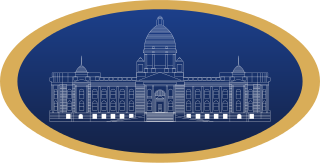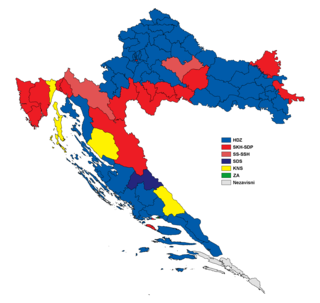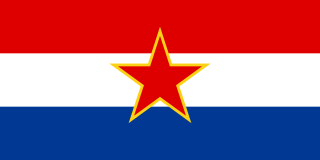The politics of Croatia are defined by a parliamentary, representative democratic republic framework, where the Prime Minister of Croatia is the head of government in a multi-party system. Executive power is exercised by the Government and the President of Croatia. Legislative power is vested in the Croatian Parliament. The Judiciary is independent of the executive and the legislature. The parliament adopted the current Constitution of Croatia on 22 December 1990 and decided to declare independence from Yugoslavia on 25 May 1991. The Constitutional Decision on the Sovereignty and Independence of the Republic of Croatia came into effect on 8 October 1991. The constitution has since been amended several times. The first modern parties in the country developed in the middle of the 19th century, and their agenda and appeal changed, reflecting major social changes, such as the breakup of Austria-Hungary, the Kingdom of Serbs, Croats and Slovenes, dictatorship and social upheavals in the kingdom, World War II, the establishment of Communist rule and the breakup of the SFR Yugoslavia.

Yugoslavia was a country in Southeast and Central Europe that existed from 1918 to 1992. It came into existence following World War I, under the name of the Kingdom of Serbs, Croats and Slovenes from the merger of the Kingdom of Serbia with the provisional State of Slovenes, Croats and Serbs, and constituted the first union of South Slavic peoples as a sovereign state, following centuries of foreign rule over the region under the Ottoman Empire and Austria-Hungary. Peter I of Serbia was its first sovereign. The kingdom gained international recognition on 13 July 1922 at the Conference of Ambassadors in Paris. The official name of the state was changed to Kingdom of Yugoslavia on 3 October 1929.

The Croatian Parliament or the Sabor is the unicameral legislature of Croatia. Under the terms of the Croatian Constitution, the Sabor represents the people and is vested with legislative power. The Sabor is composed of 151 members elected to a four-year term on the basis of direct, universal and equal suffrage by secret ballot. Seats are allocated according to the Croatian Parliament electoral districts: 140 members of the parliament are elected in multi-seat constituencies. An additional three seats are reserved for the diaspora and Croats in Bosnia and Herzegovina, while national minorities have eight places reserved in parliament. The Sabor is presided over by a Speaker, who is assisted by at least one deputy speaker.

The National Assembly or simply Skupština is the unicameral legislature of Serbia. The assembly is composed of 250 deputies who are proportionally elected to four-year terms by secret ballot. The assembly elects a president (speaker) who presides over the sessions.
Parliamentary elections to the Assembly of Kosovo have been held four times since 1999 with the latest in December 2010. The Assembly was an institution within the Provisional Institutions of Self-Government (PISG) established by the United Nations Interim Administration Mission in Kosovo (UNMIK) to provide 'provisional, democratic self-government' in advance of a decision on the final status of Kosovo. Kosovo, formerly a province of Serbia, came under UN administration in 1999 and unilaterally declared its independence in February 2008. The Assembly elected in 2007 continued in office after the declaration of independence.

Parliamentary elections were held in the Socialist Republic of Croatia between 22 and 23 April 1990; the second round of voting occurred on 6–7 May. These were the first free, multi-party elections held in Croatia since 1938, and the first such elections for the Croatian Parliament since 1913. Voters elected candidates for 356 seats in the tri-cameral parliament; the turnout in the first round ranged between 76.56% and 84.54% for various parliamentary chambers. In the second round, the turnout was 74.82%. The Croatian Democratic Union (HDZ) won 205 seats, ousted the League of Communists of Croatia – Party of Democratic Reform (SKH-SDP) from power and ended 45 years of communist rule in Croatia. The new parliament convened for the first time on 30 May, elected Franjo Tuđman as President of the Croatian Presidency and soon after renamed the office to President of Croatia.

After a period of political and economic crisis in the 1980s, the constituent republics of the Socialist Federal Republic of Yugoslavia split apart, but the unresolved issues caused a series of inter-ethnic Yugoslav Wars. The wars primarily affected Bosnia and Herzegovina, neighbouring parts of Croatia and, some years later, Kosovo.

The Socialist Republic of Croatia, commonly abbreviated as SR Croatia and referred to as simply Croatia, was a constituent republic and federated state of the Socialist Federal Republic of Yugoslavia. By its constitution, modern-day Croatia is its direct continuation.

The Socialist Republic of Serbia, previously known as the People's Republic of Serbia, commonly abbreviated as Republic of Serbia or simply Serbia, was one of the six constituent republics of the Socialist Federal Republic of Yugoslavia in what is now the modern day states of Serbia and the disputed territory of Kosovo. Its formation was initiated in 1941, and achieved in 1944–1946, when it was established as a federated republic within Yugoslavia. In that form, it lasted until the constitutional reforms from 1990 to 1992, when it was reconstituted, as the Republic of Serbia within the Federal Republic of Yugoslavia. It was the largest constituent republic of Yugoslavia, in terms of population and territory. Its capital, Belgrade, was also the federal capital of Yugoslavia.
A constitutional referendum was held in Serbia on 28 and 29 October 2006, in which voters decided on adopting a new Constitution. The constitution is Serbia's first as an independent state since the Kingdom of Serbia's 1903 constitution. Over 6.6 million people were entitled to vote in the national referendum.

The current Constitution of the Republic of Serbia, also known as Mitrovdan Constitution was adopted in 2006, replacing the previous constitution dating from 1990. The adoption of new constitution became necessary in 2006 when Serbia became independent after Montenegro's secession and the dissolution of Serbia and Montenegro.

The Constitution of Kosovo is the supreme law of the Republic of Kosovo, a territory of unresolved political status. Article four of the constitution establishes the rules and separate powers of the three branches of the government. The unicameral Assembly of the Republic exercises the legislative power, the executive branch led by the President and the Prime Minister which are responsible for implementing laws and the judicial system headed by the Supreme Court.

The Presidency of the Socialist Federal Republic of Yugoslavia was the collective head of state of the Socialist Federal Republic of Yugoslavia. It was established in 1971 according to amendments to the 1963 Constitution and reorganized by the 1974 Constitution. Up to 1974, the Presidency had 23 members – three from each republic, two from each autonomous province and President Josip Broz Tito. In 1974 the Presidency was reduced to 9 members – one from each republic and autonomous province and, until 1988, President of the League of Communists of Yugoslavia ex officio.

The Autonomous Province of Kosovo and Metohija, commonly known as Kosovo and abbreviated to Kosmet or KiM, is an autonomous province defined by the Constitution of Serbia that occupies the southernmost part of Serbia. The territory is the subject of an ongoing political and territorial dispute between the Republic of Serbia and the partially recognised Republic of Kosovo. Its claimed administrative capital and largest city is Pristina.

The Parliament of Yugoslavia was the legislature of Yugoslavia. Before World War II in the Kingdom of Yugoslavia it was known as the National Assembly, while in the Socialist Federal Republic of Yugoslavia the name was changed to Federal Assembly. It functioned from 1920 to 1992 and resided in the building of the House of the National Assembly which subsequently served as the seat of the Parliament of Serbia and Montenegro and since 2006 hosts the National Assembly of Serbia. The Federal Assembly was the highest organ of state power and the only branch of government in the country, with all state organs subservient to it under the principle of unified power as it was a one-party state, with the League of Communists of Yugoslavia as the sole legal party in the country. Most of the Federal Assembly's actions simply rubber stamp the party's decisions.

Second Government under Vojislav Koštunica as the Prime Minister was formed on 15 May 2007. After Serbian parliamentary election, 2008 this cabinet served as a transitional government handling only technical issues until the new government was formed on 7 July 2008.

Elections were held on municipal, provincial, republican and federal levels in Yugoslavia from its foundation in 1918 throughout its breakup in 1992.
An independence referendum was held in Bosnia and Herzegovina between 29 February and 1 March 1992, following the first free elections of 1990 and the rise of ethnic tensions that eventually led to the breakup of Yugoslavia. Independence was strongly favored by Bosniak and Bosnian Croat voters while Bosnian Serbs boycotted the referendum or were prevented from participating by Bosnian Serb authorities.

The independence of Croatia was a process started with the changes in the political system and the constitutional changes in 1990 that transformed the Socialist Republic of Croatia into the Republic of Croatia, which in turn proclaimed the Christmas Constitution, and held the 1991 Croatian independence referendum.
The Constitution of the Serbian Orthodox Church is the basic ecclesiastical legal act in the Serbian Orthodox Church.














